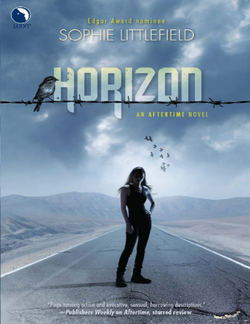Читать книгу Horizon - Sophie Littlefield - Страница 16
ОглавлениеChapter 10
CASS KNEW IT was no accident that breakfast consisted solely of day-old pone, a thick bread made in skillets over the fire from a kaysev-flour batter sizzled in rabbit fat. No fresh kaysev would be served until it had all been checked—in the daylight—a couple more times. This was mere paranoia—the odds of finding more blueleaf were incredibly low. Only the passage of time would get everyone comfortable again, would lull them back into a state of calm.
After most had eaten and before anyone could leave, Dana got up on the porch of the community center and clapped his hands for quiet. Buddy-ups always began this way, with Dana listing the early signs of the disease in his droning voice: the fever, often accompanied by a darkening of the skin and a sheen of perspiration; the dizziness that was traced with euphoria; the sensitivity to light; and the disorientation. He would go on to remind everyone that the old and young were especially vulnerable, things everyone already knew, and then he would lead them in the buddying.
Today, Cass felt people stealing glances at her—with apprehension, judgment, doubt?—and quickly looking away as they found their partners and lined up. Cass stayed rooted to the spot. She knew that Karen would come to her. She was efficient that way, one of Collette’s best volunteers, a spry sixty-plus woman who liked to say she was a “doer.”
There was good-natured grumbling that the vigilance committee, headed by Dana and Neal, had made a special effort to create as many odd couples as they could, putting people together who didn’t ordinarily seek each other out, who didn’t especially like each other. No one said it, but Cass guessed that everyone believed the same thing—that the vigilance committee figured you’d be more likely to turn in a suspicious case if you didn’t like them that much in the first place. Much lip service was given to the promise that “potentials,” as they called the symptomatic, would be treated very well, escorted to the comfortable house that had been set aside for just that purpose. The house was outfitted with magazines and books and canned food and even soda. The windows had been altered to raise only a few inches—enough to slide in a plate of food or a cup of water, but not enough for anyone to crawl out of.
The house, of course, was locked from the outside. Only Dana and two other council members had keys.
The quarantine house had apparently been used twice before, both false alarms. It wasn’t that New Eden hadn’t lost citizens to the Beaters—it had, more than a dozen—but in every case it had been from attacks on the mainland, and those unfortunates had either been dragged away to their fates or mercifully shot by the citizens.
One of the false positives was Gordon Franche, who now kept to himself. People said that the experience of being locked in the house, waiting to see if he was infected, had caused him to lose his mind. His illness had just been a virus, evidently, because after six days he was let out and welcomed back, but he withdrew from all social events and mostly spent his days reading quietly now.
The other one, a woman, had died soon after, drowning in the shallow waters off the mud beach up at the north end of the island. Supposedly, she had been an excellent swimmer. No one talked about her anymore.
“There you are,” Karen said behind her, and Cass fixed a smile in place before she turned around to greet her. They lined up with the others, in two rows before the porch, and stood facing each other, shivering a little in the shadow cast by the building.
“Temperature,” Dana called, and everyone put the back of their hand to their partner’s forehead, like thirty-five concerned mothers checking on sneezing toddlers.
“Eyes,” he said after a while, though by then most people had already checked. It was disconcerting; Cass realized the first time she did this exercise that in reality she rarely actually looked directly into people’s eyes, focusing instead somewhere around their mouths, watching their lips move as they spoke. Dor, of course, was the exception, like Smoke and Ruthie, all of whose eyes she knew like the familiar rooms of a house in which she’d lived forever. Perhaps, she thought, the feeling was a self-protective fear that eye contact might alert people to the bright green of her own irises. It was something she preferred not to think about.
Karen’s eyes were an unremarkable brown, and they were nested in wrinkles, the upper lids drooping and reddened, the lashes thin and pale. But her pupils were a healthy normal size.
Cass was about to make some pleasant, harmless comment, beating Karen to the punch for once—the importance of covering her ass socially was not lost on her—and other pairs of partners were breaking up and returning to the tables or walking off to start their workdays, when Milt Secco surprised everyone by walking up onto the porch and joining Dana. His face was pinched, and he leaned in close to speak. But Cass was close enough to hear him say, “A word, if I might, Dana—”
And she was far from the only one who turned to look at Dana’s partner, who stood frightened and lost-looking, alone at the edge of the yard.
It was Phillip.
